A slew of raids in recent months conducted by German police and partnering authorities appear to be taking aim at Vietnamese smuggling and human trafficking networks operating in Germany and beyond.
Meanwhile on France’s northern coast, the French government, with financial assistance from the United Kingdom, has doubled the number of patrols in response to migrants crossing the English Channel.
In the early morning hours of Sept. 14, about 120 members of a joint task force including German Federal Police, the Berlin police, and the city’s Finance Department descended on several apartments and businesses. The raids took place all over Berlin, including the Dong Xuan Center, a hub of the Vietnamese community in Germany. Their target: a smuggling ring said to be organizing fake paternity papers and fake marriages.
On June 28, Berlin police raided a construction company and several apartments rented by Vietnamese on suspicion of links to human trafficking.
A month earlier, 700 members of German police and Europol simultaneously raided businesses, restaurants and nail salons across Germany and Bratislava, the capital of Slovakia.
“Human trafficking is a serious issue for the Germans, so they are willing to spend half a million Euros on an investigation into such a crime, especially organized crime syndicates trafficking humans,” said Tran Hoang Viet who has worked alongside German police for the past 25 years, assisting them in investigations focused on Vietnamese suspects and victims. He has asked that RFA use a pseudonym to protect his identity.
Human trafficking, Viet explained, is not simply the smuggling of people from one country to another. It is always connected with a host of other crimes, he said.
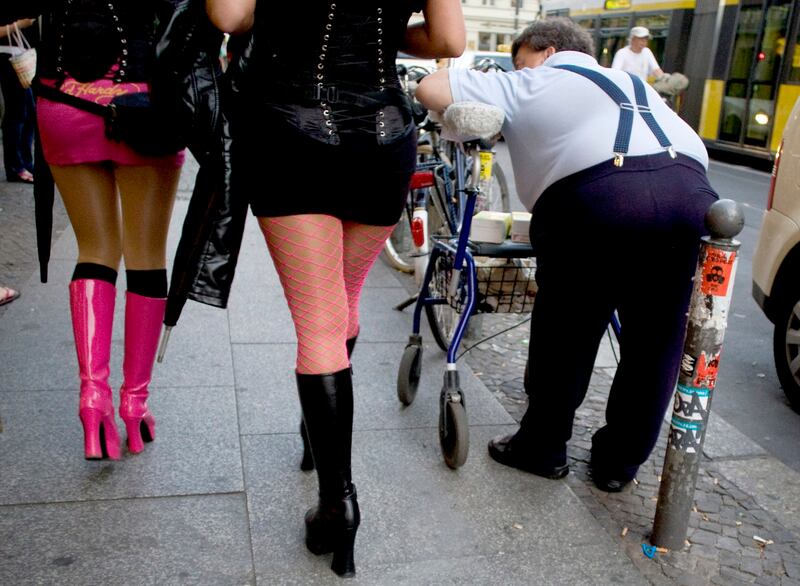
Fake husbands, fake fathers
“Human trafficking is multi-faceted. There are people who try to arrange for smuggled migrants who don’t have documentation, to obtain fake marriage or paternity papers, and through many other ways.
“Marriage fraud is very common,” he continued. “This is when the broker or smuggler makes a match and the two parties coordinate with each other so that when they are interviewed by the Immigration Office, their answers match. That’s one way (people come here illegally.) These ‘paper wedding’ arrangements can cost 35,000 Euros or more. If you're lucky and someone goes easy on you, they’ll sell it for a little less.”
The person agreeing to the fraudulent marriage might be a German citizen, or a naturalized Vietnamese with residence papers, but according to Viet, the "fake husband" does not profit much: Most of the proceeds go into the broker’s pocket.
“The second way is by having someone claim paternity for a pregnant woman. Brokers will ask for even more. Getting a fake paternity claim for a child might cost 45,000 euros or more. Those are the two main types (of fraud) that occur most frequently."
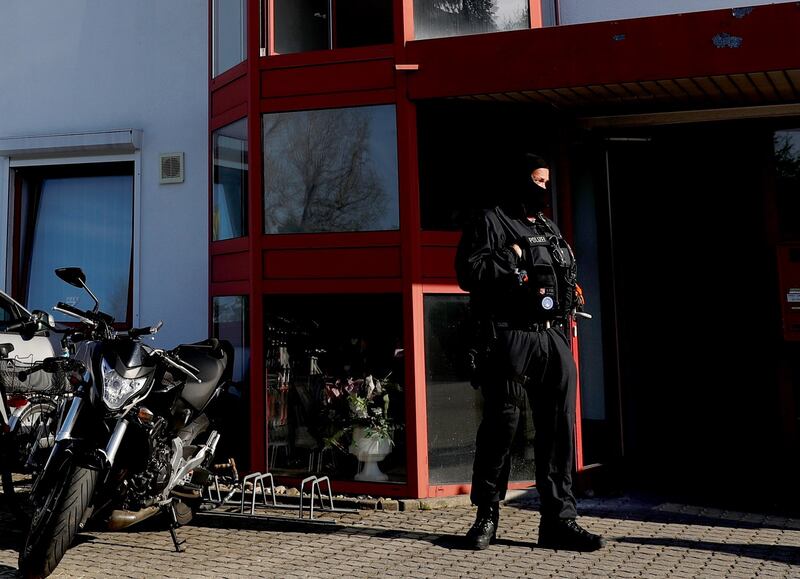
‘Large unknown dimension’
Police crime statistics show that violations by Vietnamese suspects against foreigner law provisions increased by 40% from 2018-2020, to a total of 2,887 suspects from 1,734, Chief Detective Nicole Baumann with the German Federal Police told RFA.
The annual German Federal Situation Snapshot on Organized Crime in 2019 pointed to nine crime organizations led by Vietnamese nationals, linked to crimes like people smuggling, drug trafficking, and property and wage theft. Fifty-six crime suspects were identified as having Vietnamese citizenship. But while Vietnamese nationals make up less than 1% of all suspects, the true picture of criminal activity by Vietnamese gangs and organizations is suspected to be much higher.
“The Federal Situation Snapshot in regards to human trafficking shows that Vietnamese suspects or victims don’t play a conspicuous role thus far,” Chief Detective Baumann said. “But situation snapshots can only show the known extent of the crime activity. Particularly with Vietnamese criminal offenders and victims, we are assuming that we are dealing with a large unknown dimension.”
German police have taken note of Vietnamese crime groups trafficking people across Europe for more than a decade, she added.
“We actually now have the first trial proceedings in which Vietnamese women are found to have been victimized through sexual exploitation. This is a very broad field we are dealing with, and perpetrators are taking advantage of the vulnerable situation of people with irregular or without residence permits. They exert pressure on them by threatening to go to the police and thus are able to keep them in coercive situations.”
Tran Hoang Viet, the police associate, has spoken to countless victims of trafficking through his work.
“A lot of migrants who have made it here are willingly hiding out in people’s homes,” he says. “They’ll do housework, they are like housekeepers for the home owner. Many of these owners will take advantage of the situation and difficulties of these people. They abuse them, and this happens very often. And no matter how wrong they are treating these victims, they never dare to go to the police, they never dare to speak up.”
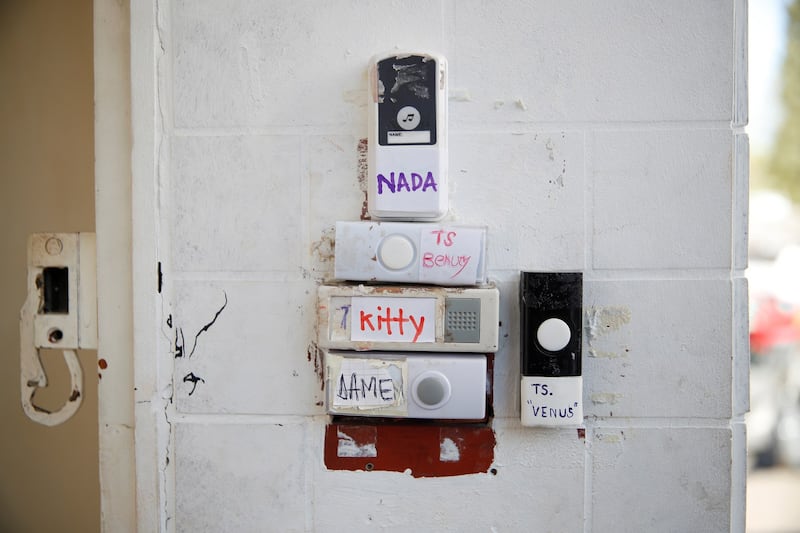
At-home brothels
Though experts say that the majority of illegal Vietnamese migrants are men, they acknowledge the risk of exploitation, and sexual exploitation, affects women in particular, and not just once they have reached Germany but during the long journey across Europe. Yet many illegal migrants do not see themselves as victims, but rather focus on their dreams for a better life, said Viet.
“There are many dangers along the way. Especially for women. On the way here, many people have gone missing. It could be that their organs are stolen. Many of the women are separated from their group so that the roadmen at the various stages along the way can assault them, can do all kinds of things with them. But migrants still accept that risk so they keep coming.”
It is impossible to know how many people have died and been discarded, or assaulted along the way, Viet said.
“The number of people who have been harmed and sexually assaulted is a lot. It’s not a few.”
In Germany, it is difficult for authorities to even ascertain just how large the extent of illegal migration from Vietnam to Germany is because for many Germany is not a destination but a transit country, said Marina Mai, a Berlin-based independent journalist who covers the Vietnamese community in Germany.
“Their ultimate destination is the United Kingdom,” she said. “They try to avoid all contact with German authorities, and they often succeed in doing so for months and years. It means they don’t ask for asylum. They don’t even officially exist.
“Normally they’ll stay for a few weeks or months, even a year and a half. It depends on their financial situation. If they only paid for their trip until (they get to) Germany, and they have to work to earn more money to continue travelling to the U.K., it could take a year and a half.”
Many find work in nail salons or restaurants, some in prostitution, where illegal migrants discover their labor is easily exploited. Their wages and freedoms might be suppressed, the work conditions might be inhumane, or their rights might otherwise be abused.
“Even if the migrant agreed to this journey and wanted to come to Germany, but they are held against their will, they have to prostitute themselves or work in a nail salon or restaurant and can’t get out, that would be considered human trafficking,” Mai said.
“But it’s very hard to prosecute. Who is the perpetrator of the human trafficking? Is it the job provider, who maybe doesn’t have anything to do with the smuggling network, but just treated the migrants inhumanely? It’s not that easy.”
At a conference this month reviewing modern slavery in Vietnam, the International Organization for Migration’s Vietnam Chief of Mission Parak Mihyung noted that “COVID-19 has worsened poverty and severely impacted vulnerable communities” and migrants are much more likely to become victims of labor and sexual exploitations as economic prospects worsen (VN Express).
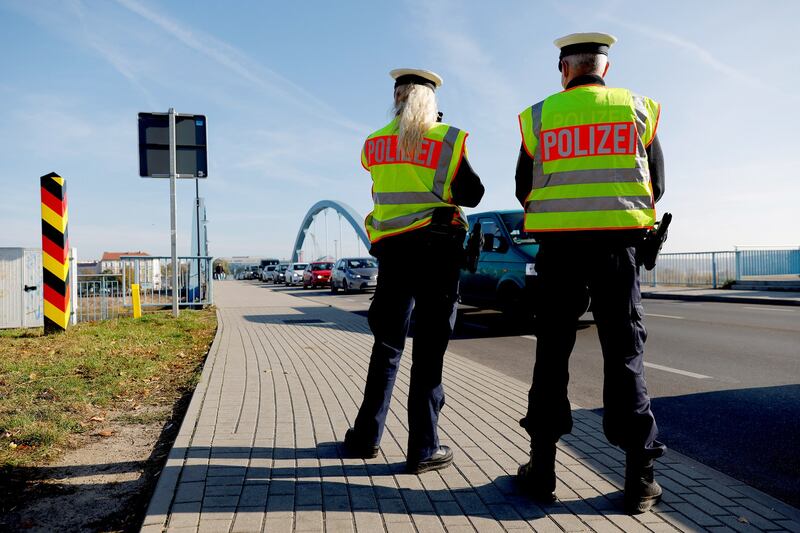
Marina Mai has seen it play out in Berlin.
“If you look into online chat rooms for suitors, you’ll find that there are many Vietnamese prostitutes in Berlin. They work in apartment brothels or massage parlors, often speak very poor German and are occasionally visibly pregnant. The suitors appreciate the low prices of the Vietnamese women,” she wrote for a Berlin newspaper.
She detailed for RFA the horrific sexual exploitation suitors would brag about online. Prostitution is legal in Germany, but these undocumented women would often be prostituted from ever-changing addresses to avoid regulation.
“There are very degrading things done there that the men share online. For example, they pay 50 euros for half an hour, but the women really do service a man every half hour. So when one man has just finished, the next one is already sitting in front of the door, or is there while the other one is still showering. These details show very profoundly that the women there are in great need.”
Coached to keep quiet
Authorities and anti-slavery advocates have noted the difficulty in getting victims of exploitation, whether it be sexual or labor, to testify against their perpetrators.
Kevin Hyland, a former independent and slavery commissioner for the United Kingdom who now serves as a member of the Council of Europe’s Group of Experts on Actions against Trafficking (GRETA) says that as Vietnamese migrants make their way through Europe, the longer their journey, the more debt they incur and the greater their vulnerability becomes.
“What was very clear was as they got further down the line, their exploitation got worse and worse and worse, so they became very, very emotionally damaged and psychologically damaged. But they still would not want to reach out for help because they still felt the pull or the control that could come from Vietnam, from the original people they had to pay the fee to get the job, was greater than their willingness to engage with the authorities.”
Tran Hoang Viet added that the lack of knowledge of the local languages, the agreement that exists between migrant and smuggler to get them to their final destination were additional factors. Smugglers also coached migrants to keep quiet, he said.
“Before they get on their way, the victims receive very thorough training and instruction on how to act when they’re caught, what to say, depending on the agreement they have,” Viet said.
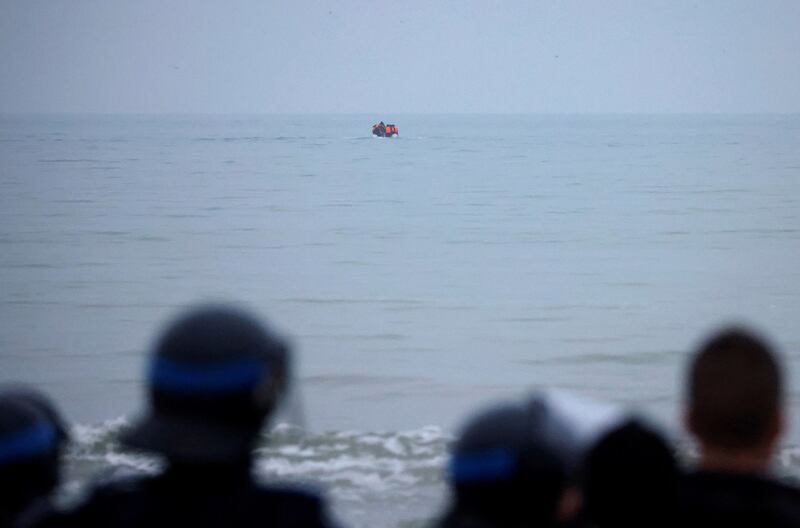
Chief Detective Nicole Baumann said to another factor contributing to victims’ reticence to speak out: “The perpetrators as well as the victims often belong to the same Vietnamese community. They know one another (back home) and so they are afraid to testify against them.”
Baumann also pointed out that Vietnamese traditionally have a deep distrust of authority figures, which impedes their willingness to seek help from victims’ advocates and NGOs.
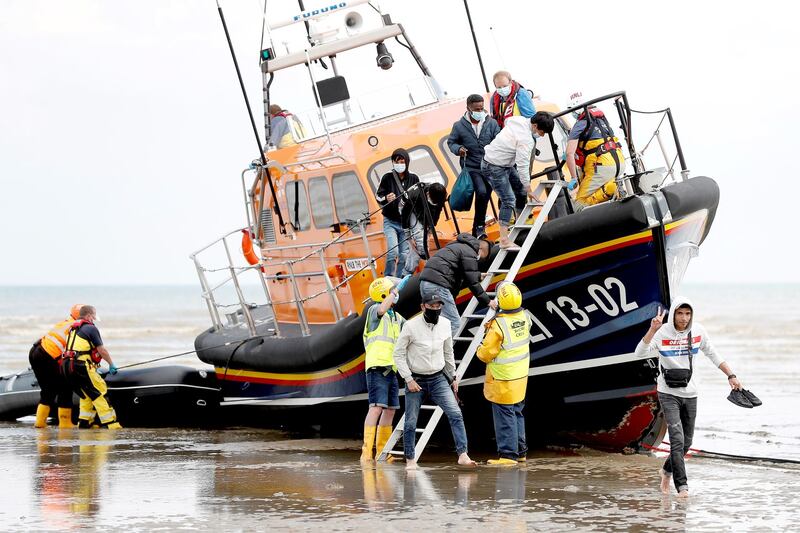
The New Boat People
In neighboring country France, Nadia Sebtaoui, a human trafficking expert who has worked with Vietnamese migrants attempting to cross the English Channel into Britain, says Vietnamese migrants differ from other ethnic groups in this mentality and that has made it harder for advocates like her to provide services — at a time when migrants most need it.
While in Germany the global health crisis has heightened migrants’ vulnerability and risk of exploitation, in France, Vietnam’s so-called “container people” have come to resort to riskier methods of travel since the gruesome discovery of 39 Vietnamese dead migrants in the back of a lorry near Essex in 2019, she said.
“After the 39 incident, and last year the pandemic, everything changed. They used to hop on the lorries or trucks like we saw with the Essex incident, in large groups, though they also went in smaller groups. Now what we have seen in the last months is that they are switching to small boats to cross the channel to the U.K. So it's very, very small boats. It's also very, very dangerous and unsafe,” she said.
Unsafe, and too often, fatal.
"Illegal Channel crossings have ballooned since the end of 2018 despite repeated warnings by French authorities of the perilous journey, fraught with heavy maritime traffic, icy waters and strong currents. Since 2018, French authorities have confirmed 11 deaths and three people are missing," national broadcaster France 24 reported in August.
In May 2021, the Belgian coast guard received a call for help from a boat in distress off the coast of Belgium. AFP reported that water had already lapped into the boat when the coast guard arrived, just in time to rescue all 49 people on board. Authorities reported that the vast majority of these “boat people” were Vietnamese nationals who had left from France’s shore and were headed for Britain.
According to the Press Association, a British news agency, so far this year more than 14,000 migrants have crossed the English Channel using small boats, 6,000 more migrants than had made the trek just last year. Vietnamese citizens are often counted among the three or four largest nationalities making the dangerous voyage, next to Albanians, Sudanese and Iranians.
Police detective Baumann confirmed smugglers and their Vietnamese clients have of late begun to take on new migration methods.
“As far as the migration routes goes, we know the smuggling of migrant most often takes place by plane to Russia and continues via Eastern European states by car, bus or on foot into the EU,” he said. “The journey continues into Great Britain via trucks through France, or by ferry from the Netherlands. But most recently, they have even used dinghies to get to the U.K. That’s a relatively new modus operandi.”
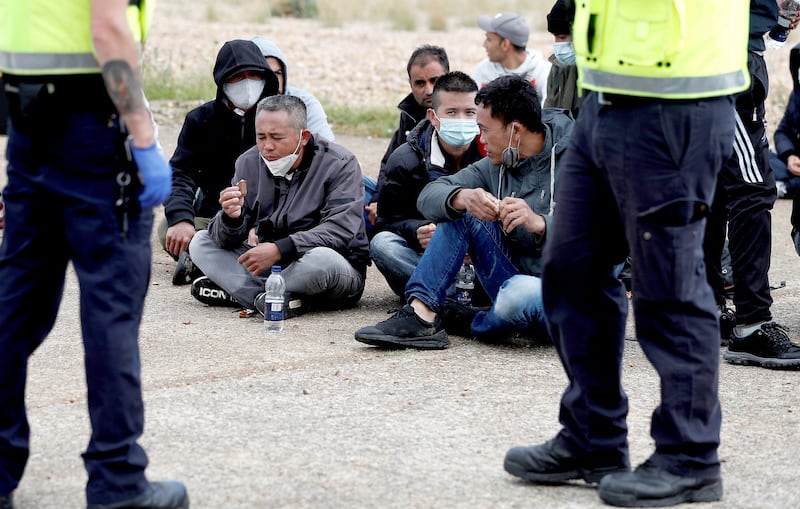
Baumann said it’s too early to know whether this development is connected to the coronavirus pandemic or simply a novel means of transportation for smugglers.
“These smuggling organizations are very creative,” she said.
Britain and France have stepped up efforts to stem the tide of illegal crossings. In July, French interior minister and Britain’s home secretary signed an agreement to again double the number of patrols on the French coast, a move described as “saving twice as many lives as in the same period in 2020.”
Both governments also agreed to widen the area of patrols, deploying surveillance technology such as drones, and investing in migrant detention centers. The U.K. pledged 62.7 million euros for the effort just this year. At the same time, Britain’s home secretary acknowledged that the increase in patrols has led smuggling rings to change tactics and set sail from farther away from French beaches, in effect making channel crossings even longer and riskier for migrants and asylum-seekers.
Vietnam has once before in its history seen large numbers of its citizens leave the country in boats and dinghies, searching for a new life. Unlike the waves of boat people fleeing communism after 1975, this time, their voyage is facilitated by human smugglers.
